
Climate Action
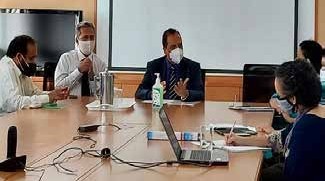
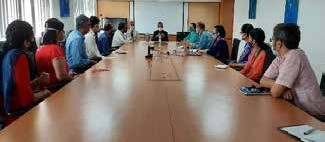
The International Panel on Climate Change (IPCC) has established that human activities have caused global temperature to rise above 1.0°C above pre-industrial levels (before the 1880s) and that, if increases continue on the cur- rent trajectory, global warming will likely reach 1.5°C between 2030 and 2052. These changes to climate pose risks to health, livelihoods, food security, water supply, human security, and eco- nomic growth, and will increase as temperatures reach 1.5°C and increase further as temperatures increase to 2°C above pre-industrial levels. The impact of global warming of 1.5°C and beyond will be greater on disadvantaged and vulnerable populations, indigenous peoples, and communi- ties whose livelihood is dependent on agricultur- al or coastal activities. Global warming will also contribute to increases in poverty and will have a disproportionate impact on women who are poor and from other disadvantaged groups and whose livelihood depends largely on agriculture.
NitteDU and climate change mitigation:
NitteDU believes in the motto “Nurture Nature”. It thrives towards creating and fostering an ecosystem that facilitates sustainable growth, ambience for learning, improved quality of life and healthy society. It emphasizes the need for exploring green options in all future plans. It is working towards creating awareness towards biodiversity, conservation of energy, waste management on campus.
DESIGN OF BUILDINGS:

NitteDU buildings have large inner spaces that provide light, air, space as well as space for indoor gardens. The quaint indoor gardens nhances the ambience and improve the quality of life indoors. Nitte DU is poised to expand its campus in Mangalore.
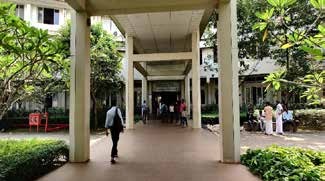
NEW NU CAMPUS:
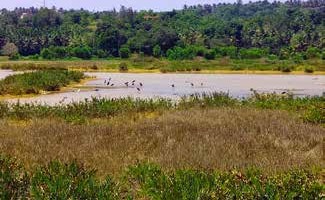
A 100-acre parcel of land near the current campus has been earmarked for the development of the new campus. The Award-winning architect Ken Yeang’s master plan is based on key strategies of sustainable landscapes.
br>
INDOOR PLANTS
The A B Shetty Memorial Institute of Dental Sciences have a good practice that targets the improvement of indoor air quality. Every common room has indoor plants which is well- tended and provides healthy oxygen-rich air and reduce the carbon dioxide released by the human occupants. The Institute has always supported the concept of “Clean City Green City” in college by adopting various initiatives.KITCHEN AND TERRACE GARDEN:
Nitte Institute of Architecture has developed a kitchen garden as well as a terrace garden to educate the students on the design of urban horticultural practices. The kitchen garden has several vegetable crops and the terrace garden has over 50 fruit trees such as Figs, Jamoon, Chikoo, Guava, Mango, Lemon etc
AFFORESTATION AND TREE ADOPTION:
The students of Nitte University Centre for Science Education & Research have a good
practice of tree adoption. Undergraduate student volunteers have adopted several trees that were planted during the afforestation drive on campus. They ensure proper watering and care during the dry months of summer. Weak saplings are preferred for adoption over healthy trees.

PLANT A TREE ON YOUR BIRTHDAY
To improve the biodiversity of the University campus, Nitte University Green Initiative Project (NUGIP) started a campaign - “Plant a Tree on Your Birthday” in KSHEMA campus for the teaching staff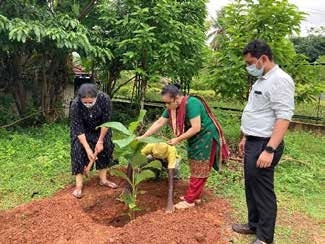
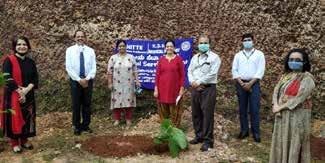
BIODIVERSITY CONSERVATION:
Medicinal gardens: The KSHEMA campus as well as Paneer campus have medicinal gardens. A total of 125 medicinal plants are planted and catalogued for their scientific name, common name, medicinal uses and their major chemical components reported.IN-FIELD CELEBRATION OF WORLD ENVIRONMENT DAY, VANAMAHOSTVA:
Every year tree planting is conducted on the occasion of World environment Day and Vanamahostva by faculty members in their respective institutions. NitteDU has 235 courses that are related to sustainable development goals. Environmental science is included in the curriculum university programs with the learning objectives of creating awareness on Climate change, global warming, ozone layer depletion, acid rain and its impacts on human communities and agriculture. Study of various natural and manmade factors that affect forests, environment and tribal populations and explore alternative sources of energy to meet the growing needs of our population.
SUSTAINABLE DEVELOPMENT GOALS AND EDUCATION
NitteDU has 235 courses that are related to sustainable development goals. Environmental science is included in the curriculum university programs with the learning objectives of creating awareness on Climate change, global warming, ozone layer depletion, acid rain and its impacts on human communities and agriculture. Study of various natural and manmade factors that affect forests, environment and tribal populations and explore alternative sources of energy to meet the growing needs of our population.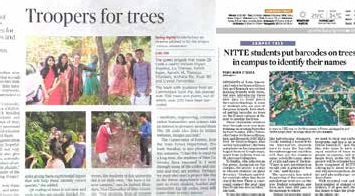
NITTE GREEN BRIGADIERS TAG TREES ON CAMPUS:
Student volunteers of NitteDU green brigade, identified, GIS tagged and generated QR codes for all the trees on campus. A project on carbon footprint is under progress.CLIMATE CHANGE AND RESEARCH ON CAMPUS:
- Dr Suchetha Kumari KSHEMA, MoU Cashew Research, Puttur, ICAR-Directorate of Cashew Research, sanctioned amount of Rs. 50000, Ongoing 2020-21
- Dr Smitha Hegde, NUCSER “Center for developing sustainable technologies for Mitigating heavy metal pollution under changing environment, VGST, Rs.25,00,000 ongoing, 2019-21
- Dr Indrani Karunasagar, NUCSER, Multiple climate impacts as bottlenecks to the microbiome of the aquatic environment (Collaborative project-3 partners, Indo-Sweden-UK) - GCRF project University of Plymouth UK is sanctioned an amount of Rs.10,00,000. Ongoing: 2019-20
- Dr Murali (NDU) as CoPI, NGSMIPS to develop adjunct anti-venom therapy for snake venom from the pharmaceuticals obtained from Coix lacryma jobi root extract BIRAC GRANT. The amount sanctioned is Rs. 2,46,250. Status: completed 2018-19
- Dr. Krishna Kumar, NUCSER, Exploring the distribution and characterization of pathogenicity islands and ecological fitness genes in seafood associated Vibrio parahaemolyticus, DST-SERB sanctioned amount of Rs. 26,65,520 Status: completed 2018-19
- Dr. Indrani Karunasagar, NUCSER: Lessons for the future: Qualifying and quantifying South Asia’s first widespread ciguatera poisoning outbreak NERC sanctioned amount of 5,50,0000. Status: completed 2019.
OUTREACH PROGRAMS:
- Prof.Dr. Smitha Hegde was invited for a Guest lecture at the Department of Economics at St. Aloysius College, Mangalore on the topic of “Carbon footprint” on 19th Dec, 2019
- Prof. Dr. Smitha Hegde was invited to speak to the Radio Manipal, Community Radio on water pollution on Dec, 27th 2020 along with Prof.Dr. Iddya Karunasagar. It was broadcasted on https://www.youtube.com/ watch?v=CPVcYjrkp2A
- Prof.Dr. Smitha Hegde, delivered a webinar session on “Naavu matte namma parisara” in Kannada on the occasion of World environment day on June 5th 2020 organized by the Padmashre tutorials and brainobrain, Badiadka, Kerala.
- Prof. Dr. Smitha Hegde, was an invited resource person for the value-added course of bioethics organized by KSHEMA on 27th June, 2020. She delivered an online lecture on “Environmental ethics”


.png)